How to Become a Coach: A Beginner's Guide
Are you considering becoming a coach? Whether you’re driven by a passion for personal growth, gaining fulfillment from helping others reach their potential, or crave the opportunity to craft a rewarding career, coaching might be just what you’re looking for.
Inspiring Change: A Guide to Becoming a Professional Coach
Your dream of becoming a coach is closer than you think. Discover the pathway to this rewarding career with our free guide.

What Does It Mean To Be a Coach?
Imagine helping people expand their creativity, enhance their productivity, or discover leadership qualities they didn’t know they had. As a coach, you can. Coaching is a collaborative partnership between a coach and a client, built on a foundation of trust.
The International Coaching Federation (ICF) — the world’s leading organization dedicated to advancing the coaching profession — defines coaching as:
“Partnering with clients in a thought-provoking and creative process that inspires them to maximize their personal and professional potential.”
ICF isn’t just creating definitions; it’s setting the global standard for effective, ethical coaching.
With a presence in over 140 countries and a network of nearly 60,000 coaches, ICF has become synonymous with coaching excellence. Our rigorous credentialing process, commitment to professional development, and focus on ethical practices ensure that coaches worldwide deliver transformative, high-quality experiences for their clients.
Becoming a professional coach goes far beyond mastering communication skills or asking the right questions — it’s about stepping into a role that changes lives. A professional coach:
- Adheres to ethical standards set by organizations like ICF.
- Pursues ongoing education to refine coaching skills.
- Commits to ongoing learning to stay up to date with best practices.
- Earns credentials to demonstrate credibility and a high standard of coaching practice.
The Impact of Coaching
Coaching delivers results. According to the 2022 Global Consumer Awareness Study, commissioned by ICF and conducted by by PricewaterhouseCoopers (PwC), the top impacts of coaching include:
- Improved communication skills (42%).
- Enhancing work-life balance (38%).
- Boosting productivity (38%).
- Improving individual and team performance (33%).
These stats show the power of coaching for individuals and organizations alike. But they’re just the tip of the iceberg on how coaching can transform lives.
While coaching may share similarities with other professions like therapy, mentoring, and consulting, it stands apart with its unique focus on empowering clients to find their own solutions to achieve their goals. Understanding the difference is essential to becoming a skilled and effective coach.
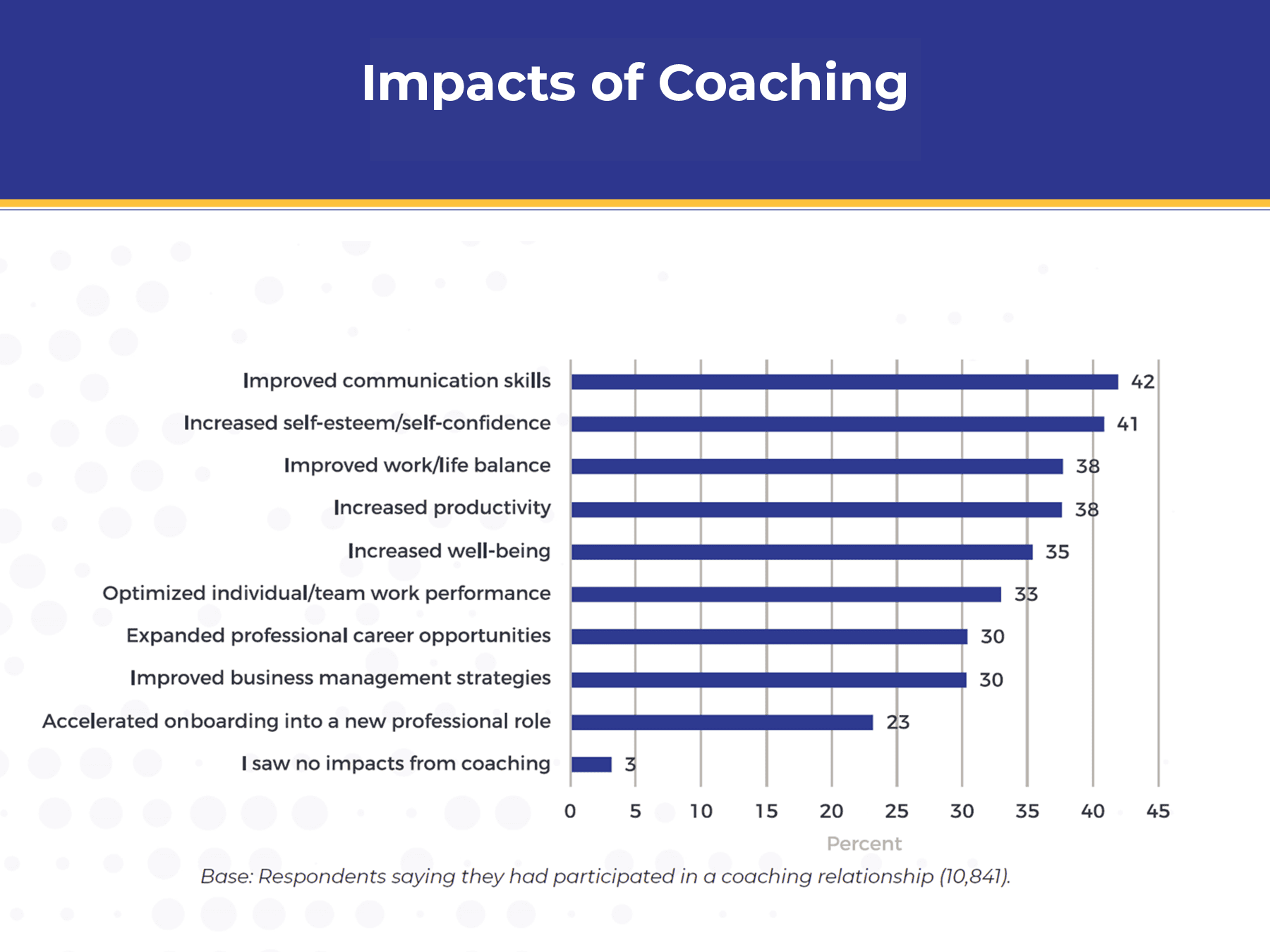
What Does a Professional Coach Do?
With coaches’ professional lives as diverse as their clients', there is no one-size-fits-all description of what coaches do.
Coaches can shape their careers to fit their strengths, preferences, and personal and professional goals. Below are just a few of the possible paths you, as a coach, can take:
- Running Your Own Business: Many coaches work independently, building their client base and setting their own hours. This option provides the flexibility that many self-starting coaches are looking for.
- Internal Coaching: Some coaches work within organizations with a strong coaching culture. These internal coaches focus on developing employees, enhancing leadership skills, and fostering team growth.
- Joining a Coaching Company: Coaches can work with organizations that offer coaching services to individuals or businesses. In a coaching company, you can benefit from established systems and an existing client base.
- Digital Coaching Platforms: Technology has made coaching more accessible. As a coach, you can partner with platforms that connect you with clients worldwide for virtual sessions.
Coaching can be conducted virtually, in-person, or hybrid, depending on your preference and client needs. Virtual coaching offers convenience and the ability to connect with clients globally. In-person coaching provides a unique opportunity to build rapport through face-to-face interaction and can create a more immersive experience.
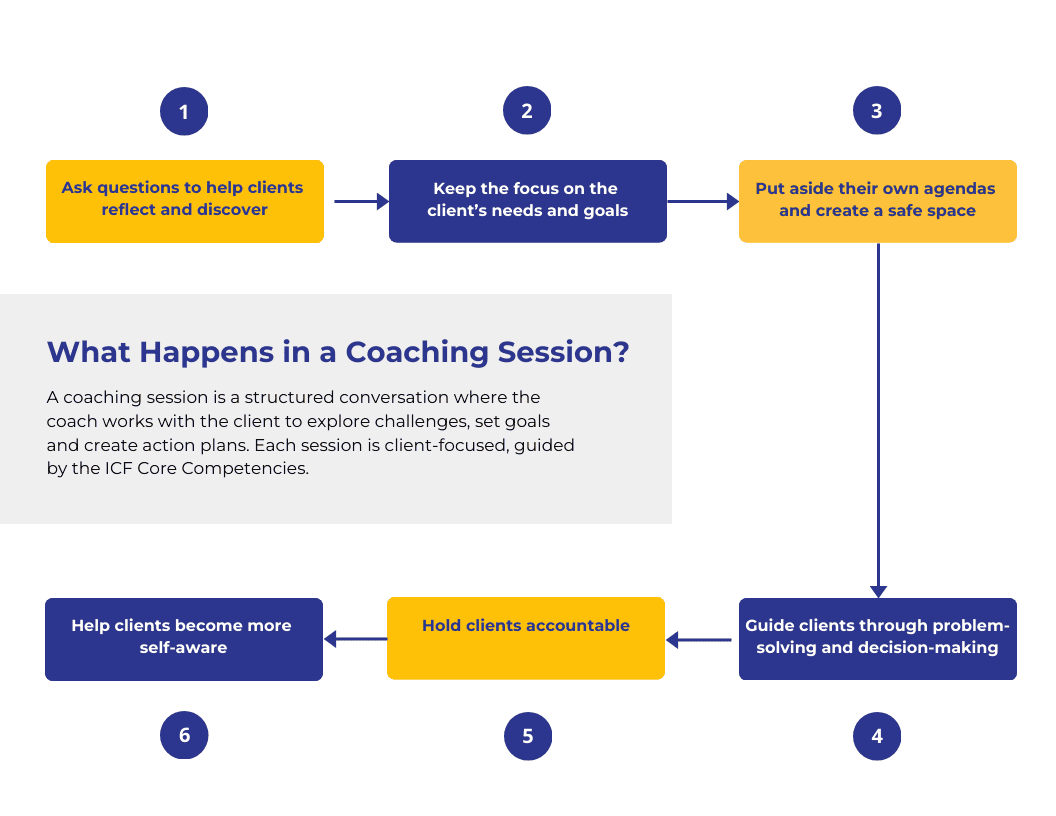
What Happens in a Coaching Session?
A coaching session is a structured, client-led conversation designed to spark clarity, explore challenges, set goals, and inspire action. Each session is collaborative and empowering, and guided by the ICF Core Competencies.
In these sessions, coaches will:
- Ask powerful questions to encourage reflection and discovery.
- Focus on the client’s needs and goals.
- Set aside their own agendas to create a safe and supportive space.
- Guide clients in solving problems and making decisions.
- Hold clients accountable for their commitments.
- Help clients identify patterns, strengths, and areas for growth to enhance self-awareness.
Why Choose Coaching as a Career?
Choosing a career in professional coaching isn’t just about what you do — it’s about who you become in the process. Coaching offers a unique blend of personal fulfillment, continuous growth, and the opportunity to create lasting, meaningful change in others' lives. Coaching could be the perfect fit for you if you’re passionate about helping people reach their potential while evolving yourself.
Below are just a few of the ways a career in coaching can enrich your life:
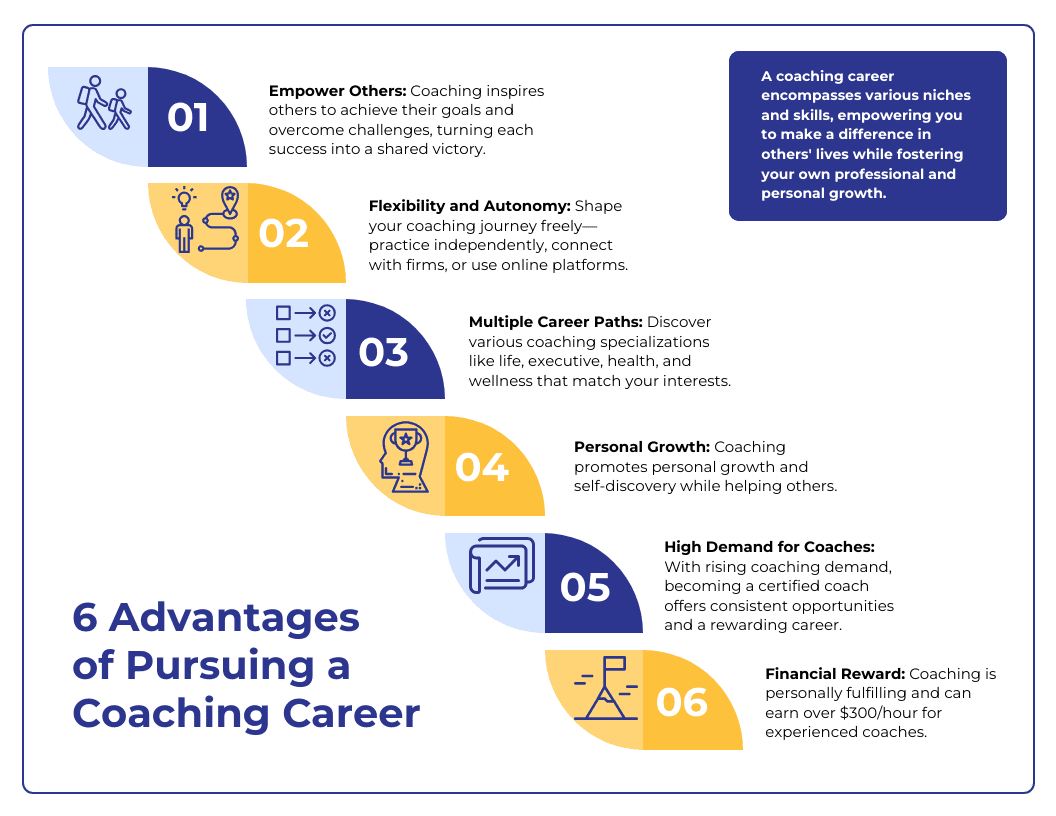
- Empowering Others: Coaching allows you to help others unlock their potential, overcome obstacles, and achieve meaningful goals. Seeing your clients thrive can be a rewarding experience!
- Flexibility and Autonomy: As a coach, you have the freedom to design your career. Whether you want to work independently, join a coaching company, or partner with digital platforms, the options are plentiful.
- Multiple Career Paths: Coaching covers many niches, including life coaching, executive coaching, career coaching, health and wellness coaching, and more. You can choose a niche that matches your passions and strengths.
- Personal Growth: As you coach others, you'll often experience personal growth. The self-reflection, continuous learning, and skill development that's built into coaching benefits both you and your clients.
Choosing coaching as a career means you'll be in a profession where your success is measured by the success and growth of those you coach. And, as a result, you’ll experience growth and success as a byproduct! It’s a role that has purpose, passion, and potential in equal measure.
What Skills Are Needed to Become a Coach?
So you want to become a coach? The road to success as a coach requires a combination of skills, qualities, and dedication to continuous growth. While coaching can be attractive to people from various professional backgrounds, there are skills and qualifications that all aspiring coaches should focus on developing:
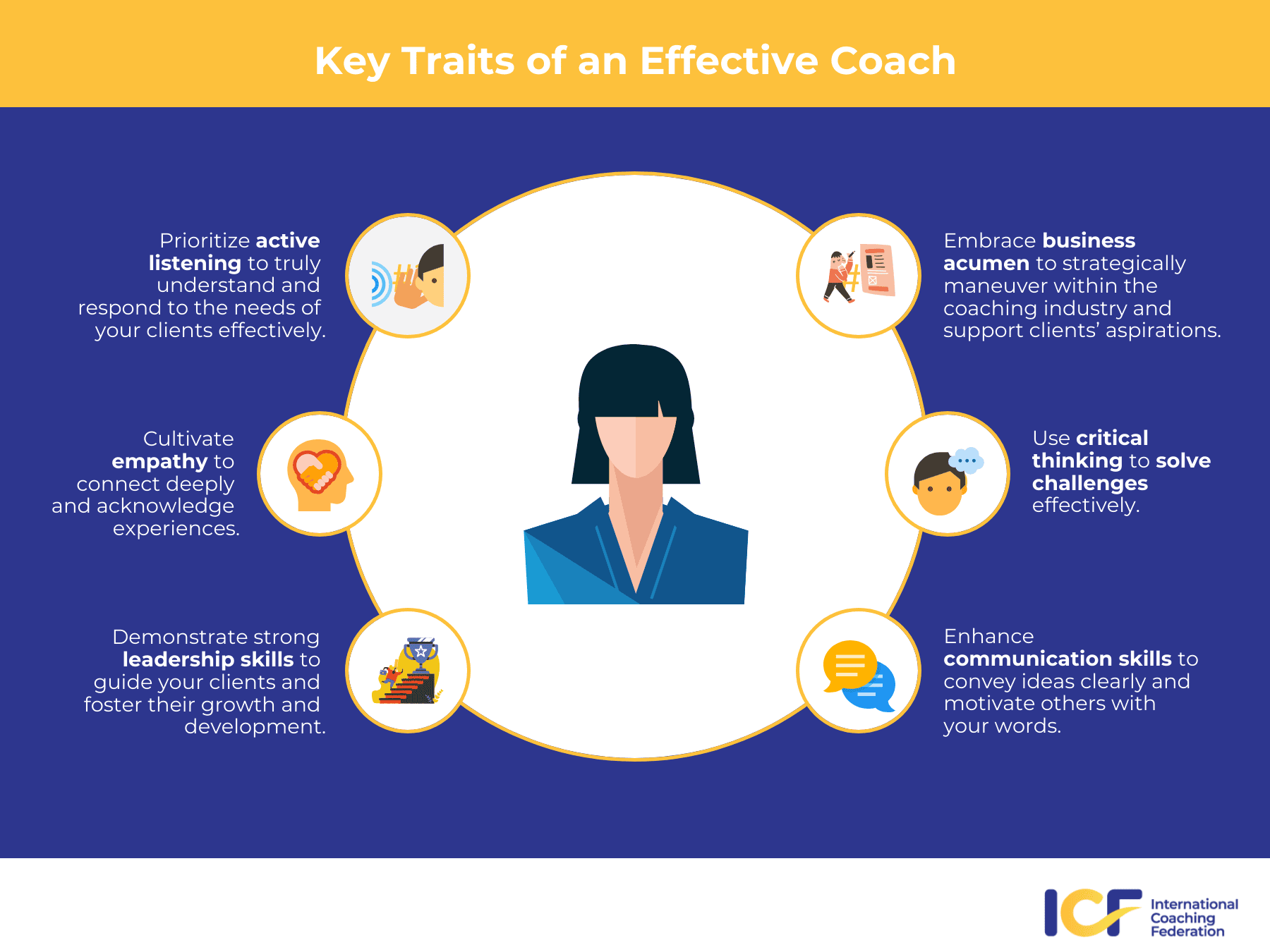
Skills for Coaching Success
Active Listening
As a coach, you must tune in completely to your clients, understanding their words, emotions, and underlying messages without judgment.
Empathy
Building trust and rapport with clients requires an empathetic approach, allowing you to genuinely connect and offer meaningful support.
Leadership Skills
Coaches guide clients toward their goals, often inspiring and motivating them to take action. Strong leadership helps set the tone for productive coaching relationships.
Communication Skills
The ability to ask insightful questions, provide constructive feedback, and articulate ideas is foundational for effective coaching.
Critical Thinking and Problem-solving
Coaches help clients navigate challenges and explore new perspectives, requiring you to have sharp analytical and creative problem-solving skills.
Business Acumen
If you choose to run your own practice or are going into the field of business coaching, understanding marketing, operations, and client management is essential to building a sustainable business.
Popular Backgrounds for Coaches
Great coaches don’t come from a single mold — they come from every corner of life, each bringing their own unique strengths and perspectives to the table. Whether you’ve spent years in a classroom, a boardroom, or on the frontlines of healthcare, your experiences can fuel a powerful coaching practice. Here are some of the most common paths people take into coaching:
Teaching and Education
If you've ever stood in front of a classroom, you know how to inspire, guide, and empower. Teachers bring a natural ability to communicate, mentor, and lead — skills that seamlessly transition into coaching.
Human Resources
HR professionals are no strangers to nurturing talent and fostering growth. With a knack for performance coaching and employee development, they’re perfectly positioned to help individuals unlock their potential in and out of the workplace.
Counseling and Therapy
While coaching isn’t therapy, many therapists find coaching a natural evolution of their work. Their deep understanding of human behavior and emotional well-being gives them a unique edge in helping clients overcome barriers and achieve their goals.
Business Leadership
Executives and managers often trade the corner office for a coaching practice, bringing with them a wealth of knowledge in leadership, strategy, and organizational development. Their real-world experience becomes a blueprint for others striving to lead.
Health Care and Wellness
Health care professionals have a front-row seat to the power of healthy habits and resilience. Many transition into coaching to support clients in achieving physical and mental well-being, translating clinical expertise into life-changing guidance.
Qualifications Needed to Become a Coach
Sure, you could call yourself a coach without formal credentials — but would you trust a doctor who skipped medical school? Or an accountant who never studied finance? Just like in those professions, top-notch education is the foundation of coaching excellence and unlocks the path to professional coaching credentials.
Think of coaching education as the launchpad for your coaching career. It’s not just a box to check — it’s your rocket fuel! A solid education propels you in your coaching journey by equipping you with the skills, confidence, and industry know-how to make a real impact.
Exploring Career Paths in Coaching
One of the most exciting aspects of becoming a coach is the number of career paths you can choose. Coaching is the ultimate profession to align your skills and passions with a specific niche to help others.
The available coaching specialties are almost limitless, but here are some of the most common options.
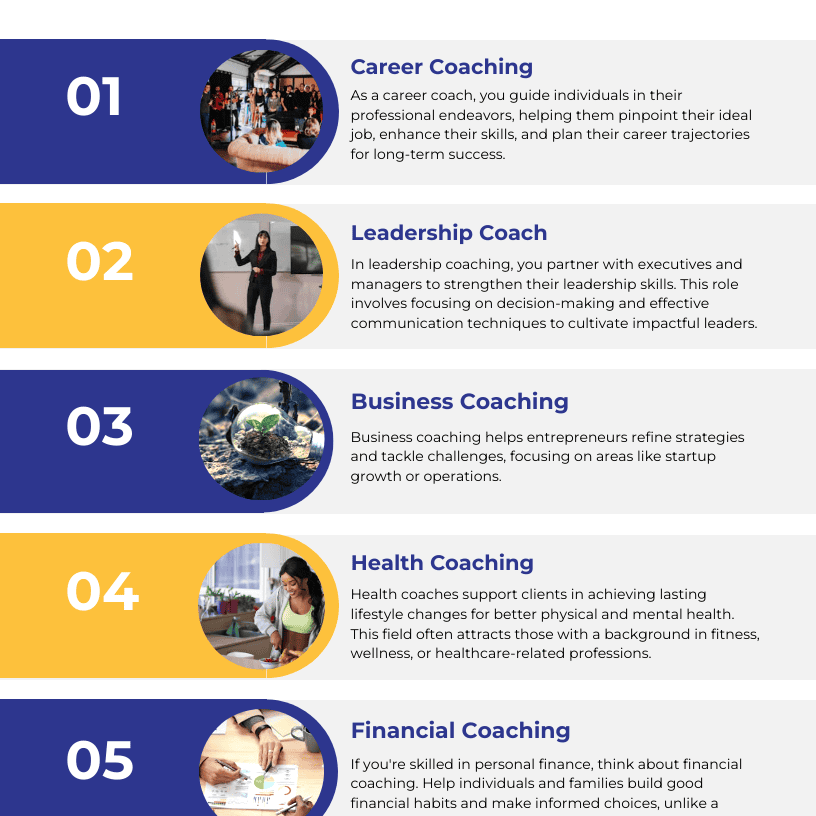
No matter which path you choose, you don’t have to decide on a niche before beginning your coaching education. The right coaching program will help you explore your interests and refine your specialty as you progress.
Leveling up Your Coaching Practice With ICF Membership
Starting a new profession is exciting — but it can also feel overwhelming. As a coach, you don’t have to go it alone! When you join ICF, you become part of the world’s largest coaching community, surrounded by like-minded professionals who support and inspire you.
Connect with experienced coaches to deepen your practice. Build relationships that accelerate your success. Shape the future of coaching together — and celebrate the impact you are making in the world.
Plus, ICF membership unlocks exclusive tools, resources, and growth opportunities to help you thrive.
What’s in it for You? ICF Member Benefits.
As an ICF member, you’ll gain access to exclusive, high-quality benefits designed to support your success as a coach, including:
- Discount on ICF Credential Applications
As a member, you’ll receive a discount on your application for the globally recognized ICF credential, the gold standard in coaching certification. - Professional Development
ICF members have access to free and discounted opportunities to learn from other coaches and thought leaders. - Coaching Community
As an ICF member, you’ll be able to connect locally through chapters and have access to ICF Engage, an online platform where you can connect with the world’s largest professional coaching community from anywhere at any time! - Ethics Resources
ICF members are held to the highest ethical standard, and as part of your membership, you’ll have access to member resources to help you maintain alignment with the ICF Code of Ethics. - Business Development
Members have access to a best-in-class selection of business development tools to help you grow your coaching business. - Cutting-Edge Research
Coaching is a vibrant and shifting profession, with new research illuminating best practices. As an ICF member, you’ll have access to all of the latest trends and information in the coaching industry.
Coaching Credentials: Setting the Standard for Professional Coaching
If you’re serious about a coaching career, acquiring the proper credentials can set you apart. In the coaching industry, credentials play a crucial role in establishing credibility and trust. In this rapidly growing profession, recognized qualifications help differentiate trained coaches by validating their education, experience, and commitment to professional and ethical standards.

Career Outlook for Coaching
So, you’ve got your coaching credential (or are considering one). You might be asking yourself, “What does a career in coaching look like?”
The way your coaching career will take shape largely depends on what setting you are looking to practice in. Are you going to be an internal coach or external coach or start your own coaching practice?
As an internal coach, you'll contribute within a single organization, helping to develop its people and culture. As an external coach, you can work independently, impacting multiple organizations on a contract basis. Or, as a coaching entrepreneur, you can build a business that serves your needs and lifestyle.
One thing remains clear across all coaching settings: the demand for credentialed coaches is on the rise.
According to the 2023 ICF Global Coaching Study, the majority of coaches (80%) agree that their clients expect coaches to be certified or credentialed. And a whopping 92% of coaching clientes whose coaches held a credential were satisfied with their coaching experience.
These trends highlight the expanding opportunities and bright future awaiting those who invest in their coaching credentials.
Starting Your Coaching Business
Starting your own coaching business can be an exciting step that may combine professional fulfillment with entrepreneurial freedom.
Legal Considerations for Starting a Coaching Business
Starting your own coaching business is an exciting adventure, filled with opportunities to make a meaningful impact while building a career on your own terms.
But alongside the thrill of launching your practice comes the essential task of ensuring your business is set up for success—legally and professionally.
Understanding the legal landscape is a crucial step in creating a strong foundation that protects both you and your clients, allowing you to focus on what you do best: transforming lives.
Some key legal considerations to keep top of mind:
- Business Registration: You’ll need to make sure your business is registered with the appropriate authorities in your region, state, territory, or country.
- Licensing and Permits: Depending on your location and the type of coaching services, you may need specific licenses or permits.
- Tax Requirements: You’re going to have tax obligations. Understanding what they are in your jurisdiction, including registering for a tax ID and tracking income for reporting purposes, is critical.
- Client Agreements: As a coach, you must draft clear, professional contracts outlining your terms of service, payment policies, and confidentiality agreements.
- Liability Protection: You may want to consider obtaining liability insurance to safeguard yourself against potential claims.
These are just high-level considerations, it’s always best to consult with legal and financial professionals to ensure you meet your legal requirements!
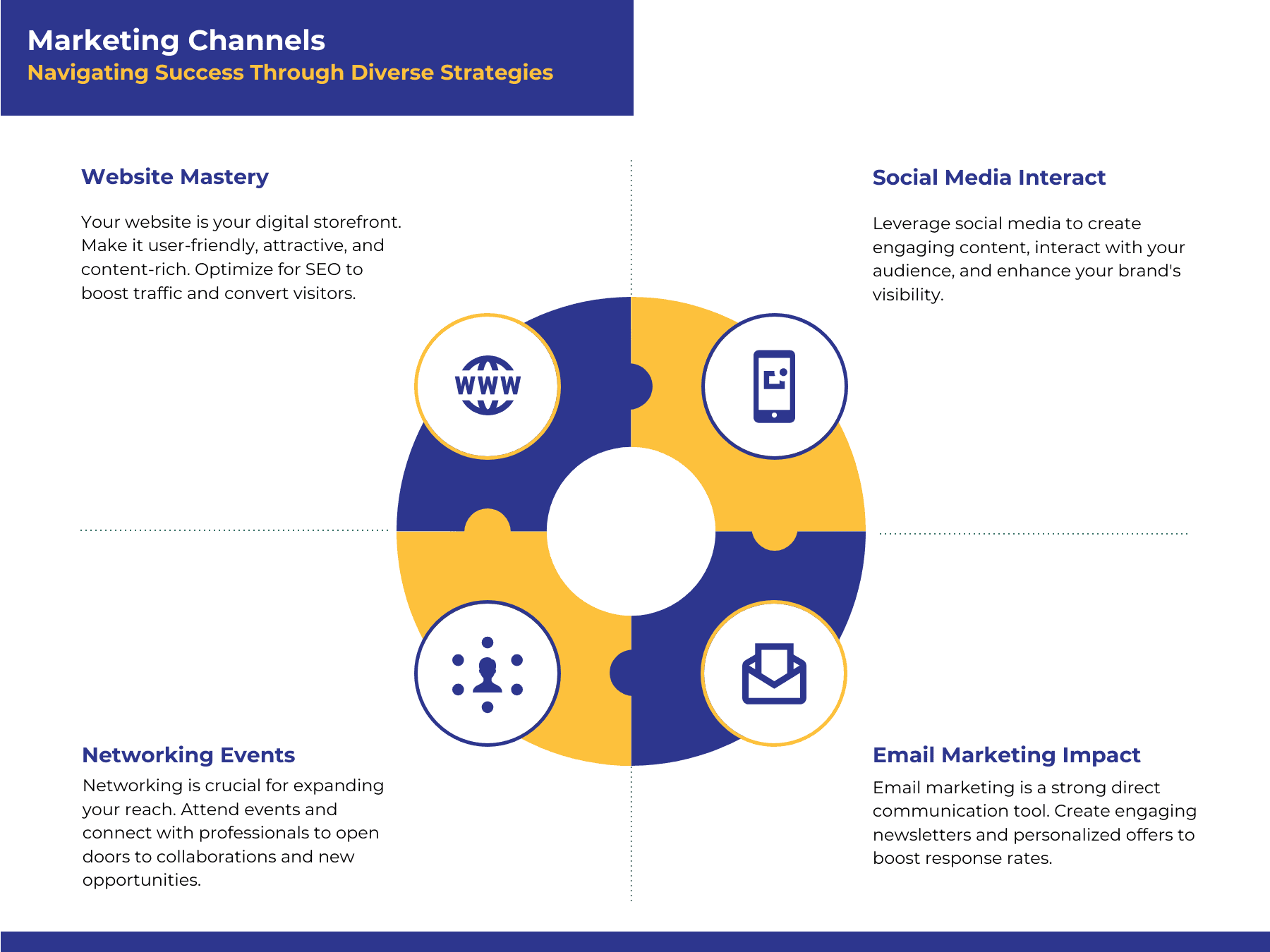
Marketing Your Coaching Business
Now that you’ve got your legal house in order, it’s time to get some clients! Marketing is an essential component of building and growing your coaching business. It will help you reach prospects, establish credibility, and nurture long-term relationships.
To create an effective marketing strategy, below are some marketing channels you should consider using:
- Website: Your website is your home base online. It should provide a simple user experience, clearly showcase your services, credentials, client testimonials, and provide an easy way to get in touch.
- Social Media: Platforms like LinkedIn, Instagram, and Facebook are powerful tools for sharing insights, connecting with potential clients, and building your personal brand. By sharing content that reflects your coaching philosophy and engages your audience, you can use these platforms as a sales tool.
- Networking: Networking is a powerful way to grow your coaching business. Whether you're attending industry events, webinars, or coaching conferences, each interaction helps you build relationships with potential clients and peers, opening doors to new opportunities and collaborations.
- Email Marketing: Once you have a list of leads and prospects, you can nurture them through email. Newsletters are one of the most popular recurring emails, allowing you to share updates, resources, and valuable insights, to keep your audience engaged and informed.
Consider using one, several, or all of the channels to amplify your reach and begin attracting clients.
Understanding Coaching in Organizations
If you prefer the structure of a workplace over the entrepreneurial path, then coaching within an organization might be for you. An internal role allows you to support teams, nurture a growth mindset, and be part of a workplace culture.

Working as an Internal Coach for an Organization
Internal coaching means being part of an organization and focusing on personal growth within company goals.
Internal coaching means working within an organization to support individual employee development and team collaboration while engaging with company goals.
Internal coaches are usually full-time employees, providing consistent and accessible support aligned to the organization's goals.
There are obviously big differences between working in a company and going solo. These include:
- Alignment With Company Culture: Unlike independent coaches, internal coaches are part of the company culture, values, and objectives. This means they understand the organizational challenges and can provide effective solutions.
- Access to Resources: Internal coaches have direct access to organizational resources, including leadership teams, employee data, and training tools, which can help create more effective coaching programs.
- Consistent Client Base: Email blasts and networking not for you? Internal coaches work with employees across organizational departments, providing stability and consistency that independent coaches may not always get.
Leaders Using Coaching Skills
Even if you’re not ready to go all-in on being a full-time coach just yet, developing coaching skills as a leader can be life-changing. Leaders trained in coaching skills help:
- Retain Employees through better communication and personal connection.
- Reduce Burnout with empathetic leadership and focused problem-solving.
- Grow by empowering employees to take ownership of their growth.
For internal coaches or leaders, using coaching skills is a stepping stone to becoming a full-time coach.

Start Your Coaching Career Today
Being a coach is more than a job — it’s a journey of purpose, growth, and impact. Throughout this guide, we’ve covered the basics of starting your coaching career — what it means to be a coach, the value of ICF credentials, and all the career paths open to professional coaches.
Whatever your next step is — education, specialization, or joining a community of like-minded people — every step forward gets you closer to being the best coach you can be.
Get Started Today
The path to being a coach is yours to create, and with ICF resources, you’re never alone. Download our guide, Inspiring Change: A Guide to Becoming a Professional Coach to access everything you need to get going.
Your coaching career starts now — let’s do it!